#people close to her that she views as having the moral authority to say it
Explore tagged Tumblr posts
Text
Fans are Denji's source of unhappiness

First observation: Fumiko is worse than Barem
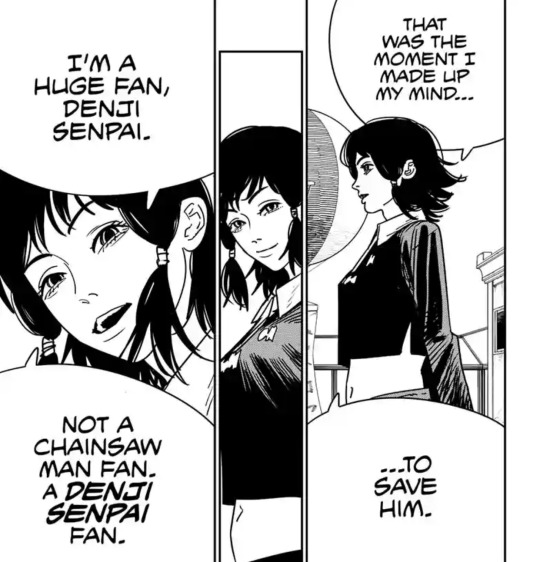
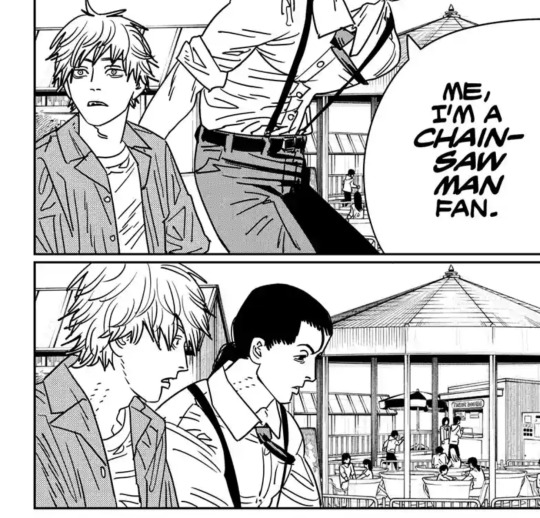
I don't like making meaningless comparisons, especially in a work like Chainsaw Man where when the characters aren't nuts, they remain at least morally gray. But this comparison makes sense in the sense that the construction of the chapter refers to it. As usual, let's analyze this by following the chapter's chronology.

This one takes place in a funfair, which is not an insignificant location, but we'll come back to that later. These few lines of dialogue already evoke a very simple idea: Denji isn't so stupid that he wouldn't know he was being manipulated. He knows full well that Fumiko was placed in Yoshida's care not to protect him, but to keep a close eye on him, to prevent him from turning and joining the church.

But she tries to disprove all this, evoking the ecstasy one might feel if one were Chainsaw Man. Being Chainsaw Man is also a source of unhappiness for Denji, who corrects her, and Fumiko adapts to his speech, looking for the first negative point that comes to mind. I think it was a real mistake for Fumiko to mention this point, but once again, she adapts to Denji's reaction. He's completely horrified at having been observed in the bathroom, so she shares his negative view of the situation.

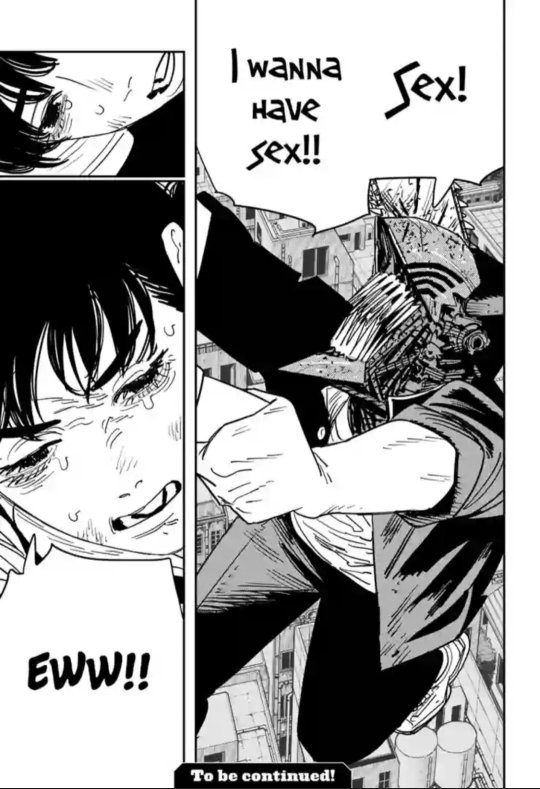
She knows that Denji's main objective is sex-related, so she builds on that by downplaying what she's doing. This is fan behavior; fans are sexually obsessed with Denji in the hope that it will delight him. But Fumiko knows no bounds, either ignoring his consent or stalking him, which logically engages Denji's rejection reaction again.
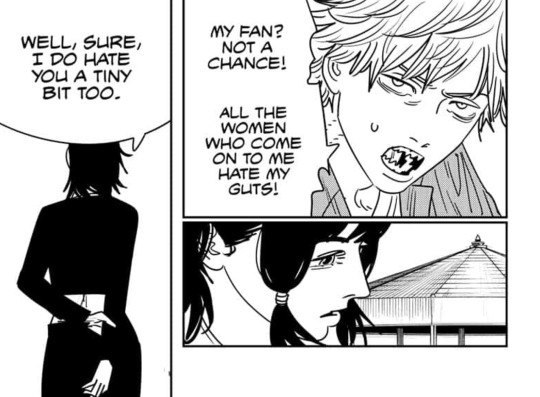
Once again, he perceives the means of manipulation with the word "fan", and rejects it. So far, these experiences have only been negative and intrusive, and even when they have been positive, whether with Asa romantically or Power platonically, the demon of control, another female figure, has put an end to them.
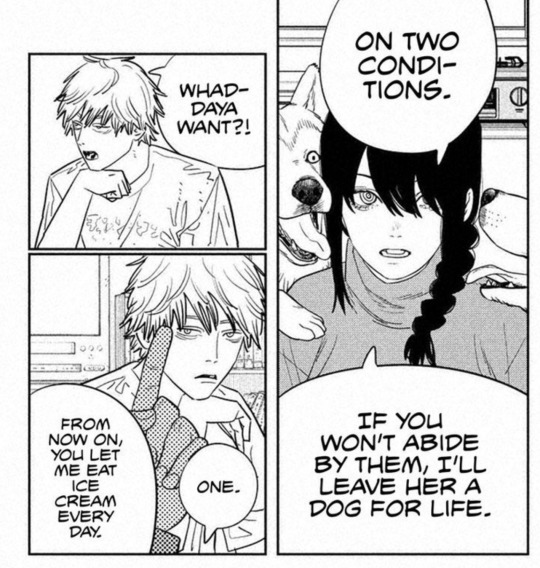

But instead of stopping the manipulation, Fumiko goes on to confirm Denji's words even as they express pure disgust and rejection. For a character who knows absolutely no limits, she may also override stopping this conservation, but she continues with her family history. If public demon hunters know anything about Denji apart from his natural distrust and need for affection, whether sentimental or physical, it's his sensitivity.
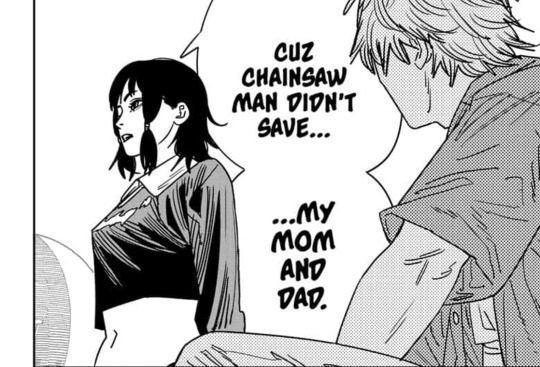
I can't say that the story Fumiko tells is a complete lie, just as I can't say that she's telling the truth. She's a hunter, and anything she mentions could well have ended up in a report, especially given the national authorities' interest in the gun demon. But even if her story is true, the tragic aspect, not for her but for Denji, is even stronger.

Fumiko says she lost her parents because of the gun demon, that CSM didn't hear her cries for help. I'd like to remind you that chapter 79, the chapter in which she refers to Aki's death, is dedicated to the trauma of what it means to be Chainsaw Man.

For the demon from the future, Aki died in the worst possible way, not for him, but for Denji. It's clear that the little boy is forcing himself to continue this snowball fight he no longer wants to play.


At first, he tries to reason with Aki, forcing him to wake up, but when he himself is shot trying to spare one of his only loved ones, people won't let him lose. Chainsaw Man is a weapon of vengeance into which everyone projects their frustrations, the deaths of their loved ones. Denji was forced to be resurrected, to kill Aki not for himself, but for the community. Chainsaw Man never acts for himself. If Aki died in the worst way for Denji, it's because his fans, this community, forced him back to life to remove one of his sources of love.
Denji was traumatized by having to win.
Let's be clear: it wasn't Denji who ignored their calls for help, it was they who ignored his.
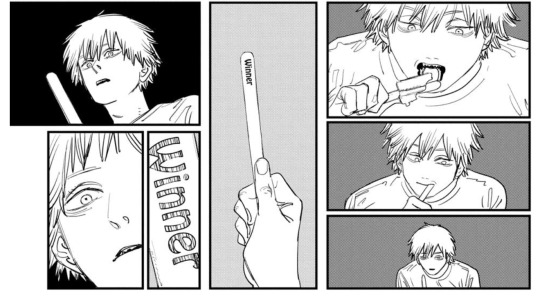

Isn't it tragic to criticize Chainsaw Man for not hearing Fumiko's cries for help, or the cries of all those people, when he was instead so compelled by them, like a machine that would be reset to kill a loved one ? Chainsaw Man, on the other hand, hears all the pain in the world. This doesn't mean that Denji is altruistic - he isn't. He's closer to amorality than compassion, but like a permanently dehumanized machine, he must serve others. It has no morals, so how can it live for itself ?

That's why what Fumiko says is so paradoxical: saving Denji means finally allowing him to live for himself, granting him the right not to hear all those voices.
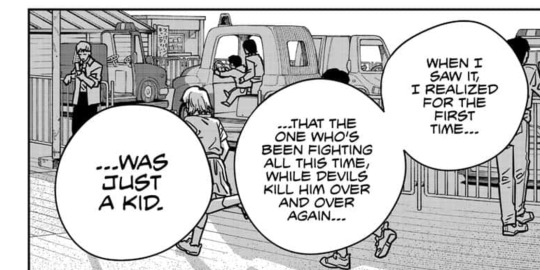
She doesn't mean what she says when she says she's never thought of him as a god, but simply as a child in need of protection. She's only setting up a dissident discourse to that of the church, which idealizes him by banking on the part of identity that is Denji, while the church banks on Chainsaw Man. How can someone who is constantly sexually abusing Denji be competent to protect a boy?
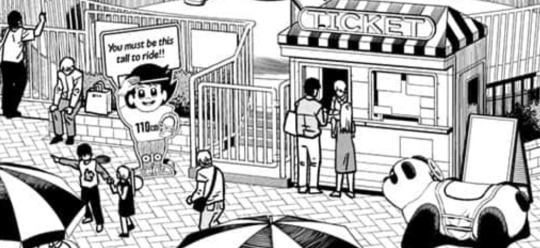
This chapter is about setting limits for children. To have access to the merry-go-round, you have to be over 1m10 tall. These clear limits were never set for Denji, either when he was forced to kill Aki or even when he explores his sexuality.
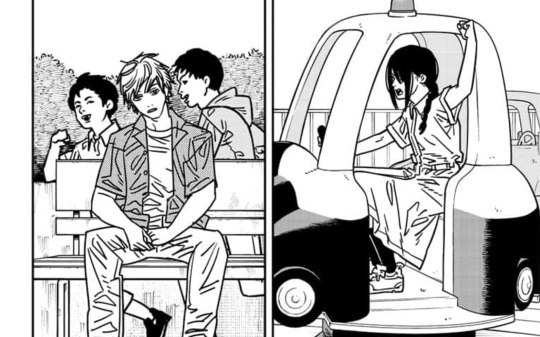
Having killed his father, been martyred by the mafia and then manipulated by a demon, Denji is now at the heart of other vicious circles. He's condemned to being too young an adult, watching over Nayuta like a parent while children play behind him, not enjoying the funfair with friends, a girlfriend, being cloistered on that bench. The bench represents the stagnation in Denji's life, his questioning, placed on the bench of his own life, his name unknown to his fans, his nature instrumentalized, his age ignored.
Denji needs and must be considered with the age he is, a 17-year-old teenager. Yet even this characteristic, even the fact that he's still a child, is ignored by Fumiko, hence her insistence on the word "senpai".

The treatment of Fumiko is good, I find her to be the very embodiment of Denji's sexual trauma in the sense that she constantly manipulates him to play on his interests, and constantly ignores his own desires, his limits.
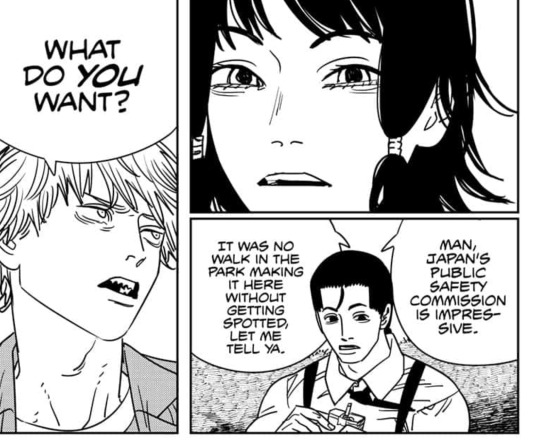
Fumiko manipulates, hence the emphasis on her outraged expression when Barem interrupts. If Barem's manipulation is more grotesque, it's not to manipulate Denji but to mock Fumiko's strategy. Although it's incredibly more insidious, the weapon has a clear idea of what she's up to.

And yet, in just a few sentences, it's right on target. It's much closer to Denji's reality than to Fumiko's human perspective. Weapons are seen as weapons, machines at the service of humans, whose immortality is a pain, as it leads them to the trauma of always winning.


Barem uses a cigarette, obviously reminiscent of those smoked by Aki, who had given in to Himeko's advances and needed an outlet for his stress. Aki's misfortune is to have spent his life on revenge, living to avenge the dead, not living for himself. The cigarette was his flaw, the proof of his humanity, the one he threw at Denji to spare him the pain of getting involved in the horrible business of hunting demons.
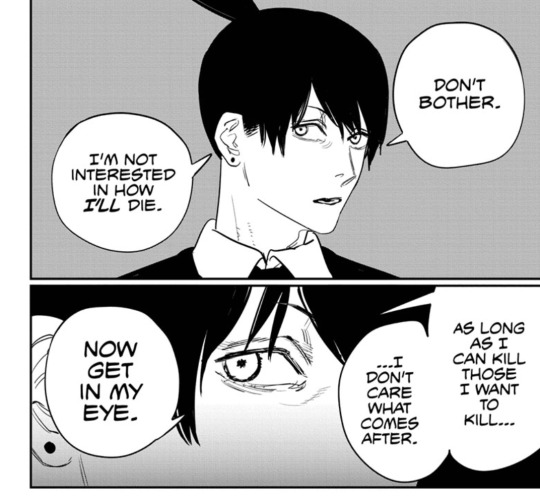

Whether or not it was there to manipulate Denji by reminding him of his older brother, whether or not it was there by chance, it conveyed the same message: proof of the humanity of a man who lived for others. A man who was executed once again for that same community.
This community, Denji's fan club, is the cause of his deepest misfortune. Chainsaw Man has never been so popular, yet Denji has never been alone. Because he's not allowed to have loved ones. Nayuta, too, is proof of this: she wants her brother for herself, and convinces him that he's loved by others by acting under the cover of Chainsaw Man.

That's why Denji's intervention to stop the attack in progress is much less certain. All these fans, this humanity waiting for Chainsaw Man, are the source of his misfortune. Of course the fan club will call Chainsaw Man. What's less obvious...
Will Denji listen to their cries for help?

#csm spoilers#csm 142#chainsaw man chapter 142#chapter 142#csm#csm part 2#chainsaw man spoilers#chainsaw man#denji#fumiko#fumiko mifune#barem#nayuta#makima#aki#himeno#my thoughts#analysis
892 notes
·
View notes
Text
Thinking about Garrus again and how much I appreciate his character, his development, his search for perspective and how it shapes his relationship with Shepard.
He always wants to do the Right Thing, as in Achieve X Positive End Goal, but the way there is so murky to him. So tough to navigate, to visualize. He likes when it's clear and when it's simple, but it simply never fucking is, so he has to Think It Through. And he simply cannot trust anyone else to do the thinking for him. He can't trust them to value the Right Thing as much as he does. He can't trust them to want it as badly.
and then, ENTER SHEPARD STAGE LEFT, and finally he finds someone that he can trust. With all of it. He can Tell she wants it just as badly, but the difference is, she seems to also have an idea of how to get there.
I've seen people complain that he has no backbone and just agrees with whatever Shepard says, and it's like… they don't get it. He needs someone in his life who he can trust to think things through with him, to meet him where he's at and to engage in good faith. She is the Only person he would ever cede to, the only authority he'll accept, because she has proven herself to care just as much as he cares.
(As a side note, that's also how I view his infamous elevator talks. He's not approaching these conversations closed-mindedly even if his word choice is often lacking or people take offense to his straight-forwardness. As I said, the path is murky for him. He's asking because he genuinely wants to know. He's practically desperate for another point of view. He wants to understand.)
He's the only character who constantly asks Shepard for her opinion on things, on morality issues and approaches and how she'd navigate all the little pitfalls that line the road to Justice. And over the games he recognizes that even this lofty end goal is anything but simple, and it's shaped by how they get there. He doesn't talk these things through with her just to follow her direction like a soldier following orders. Him accepting her response, no matter what it is, is him respecting her so much and believing so much in her true desire for achieving Justice - it's not blanket agreeing with her.
This happens so often in ME3: he'll ask, and she'll respond, and he will accept her answer without judgement, but you never hear him say "you're so right, o my moral compass". He's just mapping the path that's ahead, and he takes her opinion as much into account as his own, but that doesn't mean that he doesn't have his own or that it always aligns with hers. He wants the full picture, and at that point, he is humble enough to know that his opinion is subjective, so he needs more points of view and more intel, and there is none that he values more than Shepard's.
But it's not all for himself. They're both stuck in the same, horrible situation. He's asking her, and in turn she has to think about it and really consider all the pitfalls he's already identified but isn't sure how to approach. He's a safe sounding board for her. They think it through together, her as this unstoppable force towards the Right Thing, him as the one in the sniper's perch who sights the path ahead and calls out to her when there's a wall before she can run head-first into it. In the end, they're two people united in their striving for the same thing, two halves of a well-oiled machine. No Shepard without Vakarian.
#mass effect#garrus vakarian#this applies in literally any context romance or no romance#but i'll tag it anyway#shakarian#fuck I'm just so obsessed with him.#so many people completely misunderstand where he's coming from#and it's a little sad but it's okay because at least Shepard gets it#she always gets him#who's mshep never heard of him btw#milky.txt
419 notes
·
View notes
Note
Top Lily variants? I've seen so many "[random hp character #10] variants" online, with various degrees of accuracy, but I don't remember ever seeing one for lily. Your Jily ones were so accurate (the only pair I'm not super familiar with was peraltiago, and I know enough about them to know they fit), so I was curious if you had any just for her as a character. You basically wrote the Lily (& Jily) gospel so I trust your takes <3
*cracks knuckles*
I'm about to give you a full detailed dive into Lily's character and personality that you absolutely did not ask for. I’d have to say the ones I had already picked for Jily variants (since I always look for couples where they both have James/Lily’s personalities). I’ll try and make it to ten but there’s only so many characters that truly fit Lily for me. Mostly the characters that I see as Lily, are sarcastic, witty, overachievers, intelligent, charismatic, and snarky…
Amy Santiago (Brooklyn Nine-Nine)
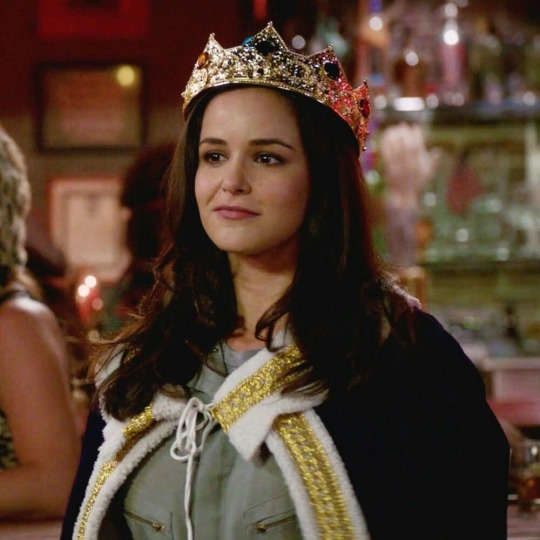
I know you said you haven’t seen it, but TRUST ME. Amy is a control freak know it all, she finds comfort in order and structure. Although she’s a bit more uptight than I imagine Lily to be. Her constant need for reassurance and approval from figures of authority is something I can definitely see in Lily. Her relationship with Holt is kinda what I imagine Lily to be like with Minerva/Alastor. Also, the fact that she is deeply loyal (as most characters in this list).
Over the course of the show she loses up a bit, and learns to have more fun and I think this could be applied to Lily in her Hogwarts years. Lily being a muggleborn is a very VERY important part of her character, as well as her morals and political standing with blood purity.
We can draw certain parallels between her and Hermione (overachievers, Head Girls, prefects), you don’t get those badges by simply passing by through school. So from this we can deduce that Lily was an excellent student that focused on exceeding at school, because there’s an extra need to prove herself among not just her teachers but her peers as well. To make them see that she’s just as much magic as they are.
So, like Amy, she's constantly trying to prove that she is smart and qualified (Amy in a field mostly male, Lily in a world mostly pureblood).
Annabeth Chase (Percy Jackson)
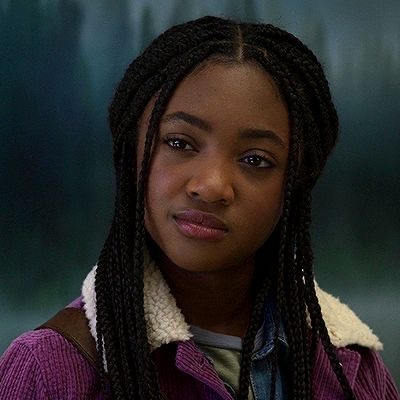
Annabeth too is a smart character that wants approval —in this case, from her mother—. She is more arrogant and snarky, a little sharper around the edges, which is so Lily!!
Her upbringing has made her become more guarded with her feelings and who she puts her trust in, also her reluctance to accept Luke’s betrayal. These are things that I see in Lily’s canon descriptions and appearances. From growing up with a sister that does not accept her and being betrayed by her best friend. In canon, after SWM (Snape’s Worst Memory), when Snape camps outside her common room waiting for her to ask her for her forgiveness she says that she has been making excuses on his behalf for a while. A lot of people call Lily a hypocrite for only ending her friendship with Snape after she was personally affected by his views, but personally I think that’s part of what makes her such an interesting character.
She’s at war with herself, not really there or here, having to be in the middle of two worlds that do not fully accept her (Annabeth with her father and Camp Half Blood/ Lily with the muggle and wizarding world). And after losing one of the people connecting her to a place of security (Thalia/Petunia), she refuses to see that the last person connecting her to that safe place is also going to leave her to join a side of the war opposite to hers (Luke/Snape).
Kate Sharma/Sheffield (Bridgerton TV/Books)
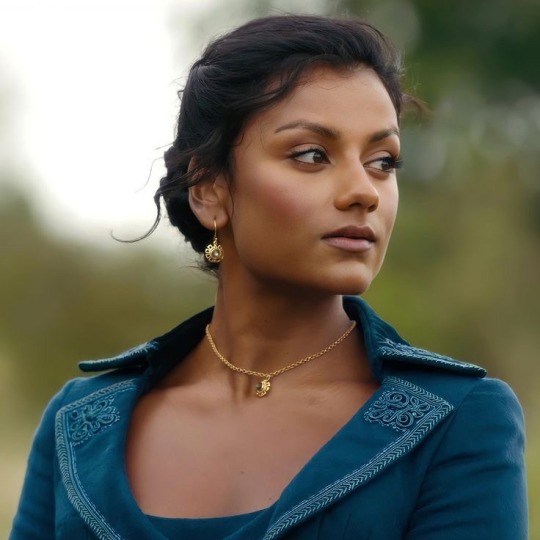
Kate is funny, closed off and witty. She rushes to judge people and decide for herself whether they are worthy of her time or not, sometimes without even bothering to actually know them. Sometimes (specifically in the books), she’s so ridiculous and funny, not really forcing herself to fit in societal norms, which is something I can definitely see in Lily.
Also, her on the show with Anthony in S3, is just how I imagine married Jily, just perfect.
Dana Scully (The X Files)
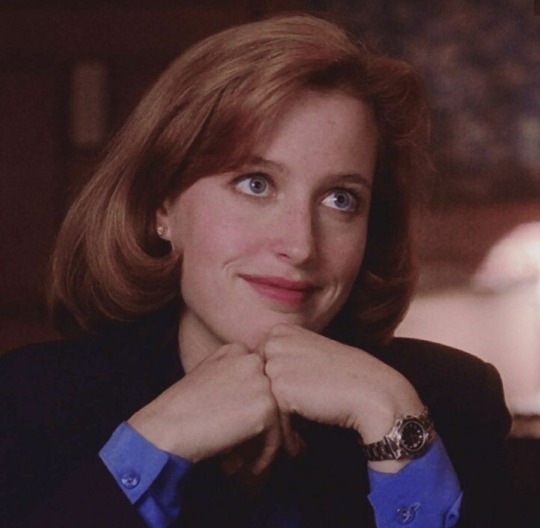
In Dana I see Lily’s fierce loyalty and sense of right and wrong. The hiding of her emotions, and also how determined she is, that even though she wants to believe she doesn’t, not even after seeing hundreds of crazy things happen in front of her, she still clings to her own truth.
Tiana (The Princess and the Frog)/Cinderella (1950)
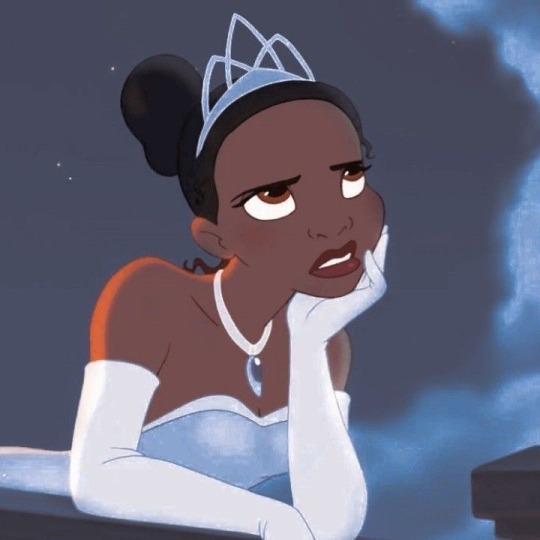
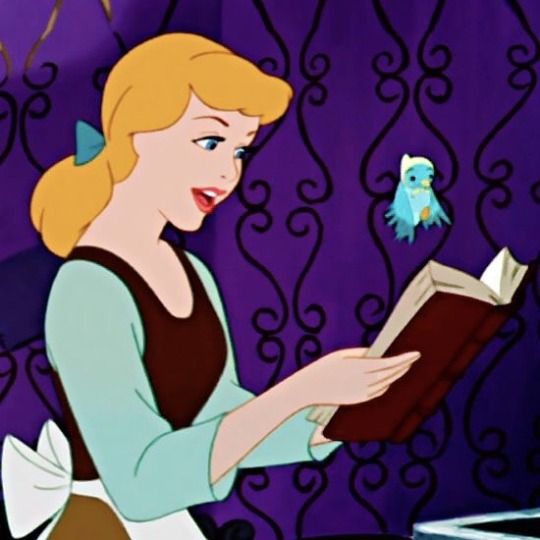
Tiana and Cinderella remind me of Lily in the sense of a hardworking woman, also really headstrong and married to her own way of thinking. A shell hard to break, because of all the walls she’s put up in order to survive. Like Lily, Tiana doesn’t take kindly to outsiders and people who come off as standoffish (Naveen/James and Sirius), but eventually ends up getting to know them and treasuring them as life companions. And you might think me crazy for adding Cinderella, but her unwavering kindness and optimism in the face of hardship is undoubtedly Lily, she’s not all sunshine and rainbows tho —yes the 1950’s version—, she hates the situation that she’s in and wastes no time (alone with her friends) to complain about it, she bites back and only “behaves” out of survival, she’s nice and warm but also angry and headstrong.
Yoon Jin-myung (Hello, My Twenties)
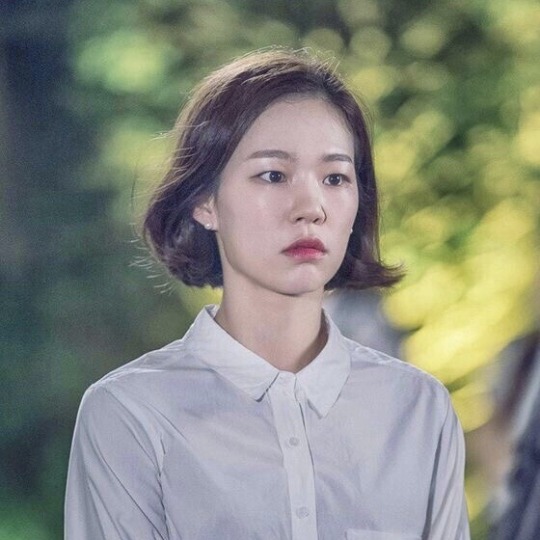
Here is another hard worker female character that I can’t help but see a little bit of Lily in. Although Jin-myung is much MUCH more shy and introverted than Lily, still, she has a complicated relationship with her family and tries really hard to do a million things at the time, forgetting to care for herself and diving into routines of work/school that are almost self destructive.
Honourable mentions.

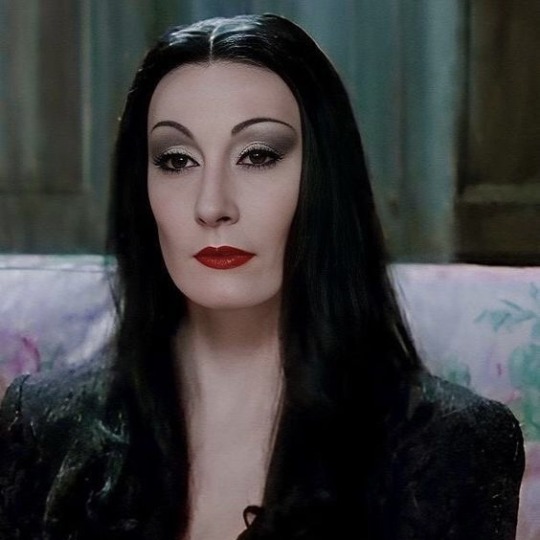
Chili (Bluey) Morticia Addams (The Addams Family Values)
Mostly how I imagine Lily as a mom/ her married life (along with Kate too). Morticia might seem like a stretch but aside from her dark interests and aesthetic, she's a loving mom and partner and she puts her family first, she’s also a bit of a freak, like Lily.

Sloane (Ferris Buller’s Day Off) Pam Beesley (The Office)
Only on the prankster side of Lily, more chill and easy going, losing up a bit to have fun with Sirius and James.
#lily josephine evans#lily evans#lily evans headcanons#lily evans variants#the marauders era#the marauders girls
100 notes
·
View notes
Note
not sure if you’ve touched on this before hint i’ve been curious lately: does edward actually like alice and bella or does he just appreciate their gifts? i’m not quite sure how to explain it but the more i think about it, the less alice seems like the kind of person edward would like. she seems to be more self-interested and cunning than the saint-like characters edward typically reveres. i’ve been wondering if their bond is less about a genuine like for each other and more about an understanding of each other's gifts.
i know edward's attraction to bella as a person vs her silent mind has been discussed before. do you think edward would've fallen for bella if she were more like characters like rosalie and jessica? for instance, assuming her mind were still closed off to him, would edward still have found bella fascinating if he perceived her to be vain and materialistic?
This is part of why I'm less interested in the gifts stuff that a lot of other people. I think it does muddy the waters with things like this. Like, are Edward and Alice actually compatible as siblings/friends or is it just like "you're the only one who understands because our author gave us these specific gifts?" And at the end of the day maybe it doesn't super matter; they DO have those gifts and it DOES help them understand one another so what it would be like without them only really matters if you're writing some All Human AU that removes the supernatural. In their world, compatibility with gifts is a thing, and probably just as valid as other kinds of compatibility and sympathy.
It is interesting that Edward thinks Rose is selfish and vain but loves Alice, when you know if it were Rosalie spending all this money on clothes they only wear once and throwing parties he would see it as another sign of her poor moral character. But part of it may be that Alice and Edward are different enough that they don't annoy each other in the same way Rose and Edward do. Both of them are more melancholy, more negative, more judgmental. Alice is more fun and happy and extroverted so Edward probably doesn't see his own flaws in her the same way he does in Rose (although they can be similar, too, in their sort of manipulative "I know best" dealings).
With Bella I think the gifts thing is even more of a factor. I mean if he could hear Bella's thoughts he'd be getting a lot of "Edward is SO hot" because that's what her narration is in the book, and I don't know that he's find that any different than how Jessica or whoever thinks about him. But because he can't read her mind, he's able to project on her, and also interpret her choices and actions in flattering ways rather than negative ways as he does with most people. And like I get it. I certainly think things I wouldn't say or do. I'm very patient and helpful at my job at the library, for example, but in my head when I see certain people coming and asking for help I'm like "ugggggh not THIS person" and "why can't you do this yourself?!?!" so if Edward were reading my mind he might be like "oh she's not as nice as she seems, she's two-faced, what a scoundrel!" when it's really just . . . being human?
If Bella's behavior was more like Rose and Jessica but Edward couldn't read her mind, that would be interesting. I guess if she also still smelled delicious he might fall for her, and then make up flattering explanations or excuses for the behaviors he doesn't like in others. "She just moved here/she's lonely/she misses her mother/she will grow out of it/whatever" when he's not willing/able to extend that same grace to Jessica because he can read her mind and judges her on her thoughts.
And this isn't me badmouthing Edward; I'm sure it WOULD be genuinely hard NOT to judge people when you're hearing what they are thinking all the time. That's going to flavor your perceptions of people in a major way. But I do think it's not really a fair or accurate view of a person, because what we DO and SAY matters more than what we think. We can have bad thoughts and re-direct them. We can think something mean and choose not to say it. We can internally grumble but do the Right Thing anyway.
I also think having the first two people he spent any time with being the uncommonly "good" Carlisle (super compassion!) and Esme (unconditional love) probably didn't help Edward get a realistic picture of what most people's thoughts are like. Judging a teenager's developing brain against a centuries-old compassion-motivated vampire doctor isn't gonna be a fair comparison. "Carlisle would never think like that" sure but he's also been actively choosing to fight baser instincts for hundreds of years, and Jessica's a 17-year-old navigating social cliques and history exams. They are not the same.
60 notes
·
View notes
Text
Before I Sleep, Pt. 1
The episode Before I Sleep (S01E15) is a Weir-centric episode that follows the events of Sanctuary (S01E14), which is even referenced at the beginning of the episode. It also deals with the fall-out from Hot Zone (S01E13), Sheppard attempting to mend his relationship with Weir. But it also allows us glimpses at the building intimacy between Sheppard and McKay.
The theme of the episode is the passage of time and of growing older, and hence we begin it with Elizabeth Weir apparently musing on it alone on one of the balconies. Her private moment is interrupted by Sheppard:
Weir: Hey. Sheppard: There you are. Weir: I was just snatching a breath of fresh air.

I want to point out that Sheppard greets her with the words he heard Rodney say to her previously on the intercom (The Storm, S01E09), verbatim. Adopting the mannerisms and vocabulary of someone you like is not consciously done but it happens, nonetheless. He also doesn't even look at her as he walks in.
There was a reason he had sought her out:
Weir: Thought you were off exploring the city. Sheppard: About to. Picked this up on the mainland. The Athosians made it. Happy birthday. Weir: Hmm. It's beautiful. How did you find out? Sheppard: Mum's the word.

He is careful not to touch her as he hands her his gift. Like, by the placement of his hands on the top and bottom of the vessel he's making sure that no physical contact happens here. We can call that respect or whatever.
This is clearly an attempt on his part to fix the broken trust between them resulting from his undermining of her authority in Hot Zone. We never learn how Sheppard had discovered that it is her birthday. Her surprise tells us that it's not something he was supposed to know, even it we might assume that, as the highest ranking military officer, he might have access to personnel files. It does tell us that he has, once more, done something without her authorization--which might well even be his intention, here. To show her that while he does things according to his own moral compass, does things a little different, he means well. He has good intentions. He is also being charming since this is as much of an apology as Sheppard is capable of making but, comparing it to his attempt at using charm to get his way in the previous episode, it's very mild.

Sheppard is not looking at her face as she unwraps the gift, he's looking at the vessel all the way up until she speaks. He also does not look up as she says "it's beautiful", there's a noticeable pause before he looks up at her so as to make sure that neither we (as the audience) nor Weir think that it's him associating the word with her face. When you give gifts to people close to you, you usually watch their face for their reaction because it's seeing their joy that brings you pleasure. What ever his reason was for doing this, seeing her pleasure was not it.
He tells her "mum's the word," which is literally saying that she can trust him to keep her secrets if she can keep his. And given how openly, how blatantly, he behaves with regards to McKay in this episode, it seems as though he has decided to show her that he does trust her with this.

As a man, he doesn't understand what birthdays often mean to middle-aged childless professional women, and why she might have sought out some time for solitary reflection on this particular day. But she appreciates his gesture, nonetheless.
Yes, some people are going to view this in a romantic light. But emphasizing her aging is not a strategy mainstream television would take in establishing a romantic relationship between two characters -- one of whom is still in a relationship with someone on Earth, mind you. They even emphasize this with Sheppard's line "Doesn't look a day over nine thousand!" later on. Also, he takes off real quick because he clearly wanted to be somewhere else.

We cut from this scene to Sheppard doing what he was supposed to be doing: exploring the city. Sheppard's voice is on the intercom and we see McKay watching his life-sign on the screen. And this is the beginning of the motif of strange intimacy between Sheppard and McKay in this episode. It's all very suggestive but, true to form, left open for alternative interpretation.
As I've mentioned before, the audience is invited to re-interpret the episodes of the first two seasons through the lens of what we learn in The Game (S03E15), and if one is so inclined, one can simply read this developing closeness and familiarity between them as a result of their game-play. We learn in the following episode, The Brotherhood (S01E16), that McKay and Sheppard have shared a lot of personal information with each other by this time. But we can also read "the game" as an euphemism for something else that has resulted in their knowing each other very well, knowing strange details about one another, being physically comfortable in close proximity, the unending banter or back-and-forth, of the creation of this private universe between them, and of their worlds surrounding one another. They did play that game a lot, after all.
Once more, we return to Sheppard and McKay's conversation in the middle of it. With Weir, we saw the beginning, the middle, and the end of their exchange, brief as it was, all of it on screen. With Sheppard and McKay we are often coming in at the tail-end of their exchange. Sheppard is with Teyla and Ford down in the city while McKay is talking to them (and by them, I mean pretty obviously Sheppard alone) on the intercom. Apparently, their exploration of the city has been going on for a while already:
Sheppard: Alright, we're done with the living quarters. Moving on. McKay: Woah-woah-woah, before you go, you see anything better than our current quarters? Sheppard: A few. Some of them are pretty nice, actually. McKay: Well, what kind of square footage are we talking about? Sheppard: What am I, your realtor, Rodney? We're here to unlock the secrets of Atlantis. McKay: Yeah, well, I'm looking for a one-bedroom with a den, preferably with a balcony, but I'm not married to it. Look, we might as well be comfortable until the wraith get here--
So, one can interpret "our quarters" as referring to the quarters currently used by the expedition at large. One could also interpret it as "your quarters and my quarters" separately, in which case it assumes that Sheppard knows what McKay's quarters are like. That's fine. But.

Sheppard answers his inquiry with "What am I, your realtor?" as though he's not interested in looking for new quarters for (or with) McKay and is just there to do a job. Only, we find them together later looking through quarters, so this is something they are and have been doing together for some reason. But this discussion on the intercom is at least semi-public, what with McKay out in the open at the control room and Sheppard with the rest of their team, so Sheppard is clearly trying to remind McKay of this fact. He actually says "We're here to unlock the secrets of Atlantis," quoting their mission statement, to not-so-subtly remind the man that keeping up appearances is a thing that is necessary. He also emphasizes the word 'secrets' because sometimes McKay needs help getting a hint.
McKay isn't hearing it, though (although he does look to his side before he asks about the square footage as though to make sure he's not being overheard on his end, which Sheppard of course does not see). He's undaunted, prattling on about the quarters he would prefer (for them; this is literally what he says). It's possible that they've been having this conversation in another context that he's excitedly picking up since it's easy to forget one's surroundings when talking with someone familiar, just like people often forget that standers-by can hear them when they are on the phone in a public place. Also, why does he look so... turned on here?


The thing about quarters on Atlantis is that we see precious little of their private living spaces over the seasons. The quarters most often visited are Sheppard's, with his Johnny Cash poster and his comically small bed. Like, the bed is so small that it suggests the room either belonged to a Lantean child or that the Lanteans were considerably shorter than humans, which does not seem to have been the case, as we get to see the original Lanteans in this episode.
Sheppard's bed is not comfortable for him to sleep in and we are meant to get a Spartan, military vibe from it. Sheppard is a soldier, he prefers to keep his living space simple. Beds are for catching shut-eye and shut-eye only, and minimal amounts at that. Comically small.

We see McKay's quarters considerably less on the show, and the first time is in Duet (S02E04). In the episode, we also see his bed. On earth, you might think this is a single. But by Lantean standards, it's the biggest goddamn bed we ever get to see on a man on the show on Atlantis. I'll return to this with the rest of the episode later but I just want to point out this fact here, as Sheppard and McKay are having a discussion about the size of something later:
Sheppard: Too big, huh? McKay: I'm not saying it's too big, I'm just pointing out its dimensions. Sheppard: Huh. It's not that… [big]
Innuendo aside (Sheppard likes 'em big), they can only be talking about either quarters or something in them. But why would anyone care about the size of the quarters or something in them? They all seem to be living in really small spaces, cramming their human lives into Lantean frameworks, so why would Sheppard think that McKay finds some quarters too big? He owns a whole-ass house on earth, as seen in Home (S01E08). Since Lantean quarters seem to be fairly uniform in size, it's more likely that they're referring to something in the quarters they've been looking at, as quarters are plural and they used 'them' to refer to them previously.
And who thinks a bed is too big? Granted, we also learn in Home that McKay feels most comfortable sleeping on the sofa i.e., in a relatively narrow space, but it's not like they're finding any Alaskan King Size beds in the city, and even if they did -- it's just more space to roll in even if you're alone. You got a whole empty city at your perusal, you have space to live large. If Sheppard's bed is a twin, McKay's bed is only a full double. What even is the issue here?

Keeping up appearances is the issue. DADT stated that in order for someone to be investigated, they had to "demonstrate a propensity or intent to engage in homosexual acts" and provide "credible evidence of homosexual conduct". I cannot overstate how much of an actual thing this was when the show was on air, and the USAF was one of the worst branches of the military when it came to pursuing allegations of this nature given the profusion of Southern Baptists in the leadership. Even if a non-heterosexual member of the military could be convinced that they were allowed to have feelings without having to justify them to anyone, acting on those feelings was not a simple matter. There could be no evidence of it.
If an officer cannot be found fraternizing with members of his sex, one of the ways it can be demonstrated that he does not is that his quarters are General Issue. The bed is for sleeping only and you couldn't entertain company there even if you wanted to. Investigating his quarters, you would have to conclude that he is, in the words of Johnny Cash, a solitary man. It's plausible deniability. But then. No one would care about the size of the bed of the head scientist.
It's interesting that McKay's bed is small enough to be interpreted as the bed of someone sleeping alone and yet it is big enough to fit two people that are both used to sleeping in tight quarters (one being the Spartan military type and the other likely comforted by the narrow space of the sofa). Again, just to point out its dimensions, McKay's is the biggest bed we ever see on the show on Atlantis (I'll return to the case of Heightmeyer's and Lt. Cadman's beds later). So.
We are actually reminded of McKay's ability and natural inclination for sleeping in a tight space in this same goddamn episode:


With the two of them sleeping in the same room, essentially sleeping together, in seemingly uncomfortable positions in an episode that begins with them hunting for something better than their current quarters. With reference to the title of the episode, you need a bed before you can sleep and here we're shown both of them, both of them, in want of a bed. Subtle.
Now, it's not my intention to claim that they had been living together secretly all these years. Clearly, there were long periods when they had fallen out and we even see Sheppard ban McKay from his quarters during Trinity (S02E06). But there are still hints. They give you just enough to speculate. The only time we see Sheppard asleep in his room is in The Shrine (S05E06), and this is, perhaps not coincidentally, the only time we see him in pajamas that, for a military man, are probably not common sleep wear. And also, just throwing it out there: Sheppard must have like a dozen plain black t-shirts he could sleep in so the panda shirt might actually belong to someone who is fond of novelty t-shirts and not even be his. In the episode McKay barges into his quarters, waking him up:
McKay: John! You were there, and-and then you-you-you-- Sheppard: Rodney, Rodney, I'm right here! What-what's wrong? McKay: I woke up, and [***] Sheppard: Oh, buddy. I'm sorry. I thought you'd fallen asleep. McKay: Oh… I was… I got so scared.
Sheppard had been there in McKay's quarters ("Let's get you back to your quarters") when he had fallen asleep and he had woken up in the middle of the night to find him not there anymore, which had scared him. Since McKay is losing his faculties, he's slurring enough that it's extremely difficult to make out what he actually says in [***]. Some transcripts render it "and Ronon had left" which it's definitely not. Some with "and everyone had left" which sounds a bit more like it, but not quite. It's more like "and I'm the only one--had left!" or "and I'm all alone--had left!". He's so agitated he's swallowing many of the words, his speech is jumbled. His final "had left!" seems to be a continuation of the thought that he couldn't get out right the first time regarding Sheppard: "You--you--you--". John, you were there and then you had left. I woke up and was all alone. That's certainly the sentiment Sheppard is reacting to.
He's extremely contrite, telling McKay that he left because he thought he'd fallen asleep, as though that's a reasonable explanation for him leaving (which McKay seems to accept). This could indeed be something someone (who canonically needs less sleep than the other) might be forced to do if they can't be found frequently coming out of someone else's quarters in the morning.
Tell me the dialogue doesn't sound like Sheppard had been there with McKay when he had gone to bed. Sure, it could be a one-off, looking over a friend in need as he's basically dying, but McKay's reaction very much speaks against this. McKay is losing his memory and it's only the most ingrained, most important things that are left to him. They're also both wearing pajamas, which is something you might insist on when someone you love is regressing basically to a childlike state (and further, there's a medical professional in charge of his care that has suddenly taken a special interest in him while McKay had, by this time or shortly thereafter, very definitely even forgotten what her name was).
What we learn from this scene is that Sheppard doesn't usually sleep in his quarters wearing pajamas. Finding him not there with him was something so unexpected that it frightened McKay. He's losing his memory, he's losing his faculties, but he's also falling into a state of raw honesty. He needs John Sheppard there, with him, in his quarters that are his alone in name only and are actually shared by them, and he needs him to be there when he falls asleep and he also wants him there when he wakes up--even if that was something that ordinarily rarely happened.
There's also a whole thing in Doppelganger (S04E04) where Sheppard is sitting on his tiny bed unable to relax and then heads out of his quarters with purpose, runs into Teyla as he opens the door and then claims he had just been meaning to go find her as he was supposed to be sequestered and not leaving his quarters. He gives her a comforting hug, for just having lost--let's say--a friend, very obviously touching her bare skin, with Teyla currently hosting 'the entity'. And then, in the next scene, we find out that the entity that jumps via physical contact from person to person is not in Sheppard, as we were meant to suspect, but is suddenly and inexplicably in McKay.
There are... a few steps there that were obviously skipped but we can fill in the gaps with Sheppard, not in his tiny bed, touching the bare skin of the next host who apparently thinks that Sheppard frequently has nightmares about hot girls like it's a conversation they've had several times before. But anyway, we'll circle back to that later. Point is, over the years, we learn that they both know way too much about how the other person sleeps ("Only when he's awake" = Not when he's sleeping). But, as stated previously, you can attribute it all to 'the game'.* Or whatever. They're just good friends who are concerned about the other's sleep.
It's also interesting that McKay mentions the word marriage here. Obviously, he's not talking about literal marriage, using it as a turn of phrase. But his choice of vocabulary is not insignificant, given the domesticity in this episode. It speaks of subconscious desires (to marry someone in general, if you wish). But I will also point out that Canada was very much in the process of recognizing marriage equality when this episode originally aired, several provinces introducing it during the first season. This was the hot potato issue of the day. Anyway, as McKay is hunting for a bigger bedroom with his buddy boy pal, marriage is literally what he had on his mind.
But alas, their search is temporarily halted as Atlantis has to do what Atlantis does best. Ford stumbles onto something weird.
Continued in Pt. 2
-* But if you twisted my arm, it's between The Defiant One and Hot Zone that they first 'hooked up', to coin a phrase from the show. By this time, they've been there for months with slim hopes of ever getting back to Earth and have all run out of distractions. Which just makes Sanctuary that much more tragic, as they hadn't just been sleeping together but, as we learn in the following episode, had by this time been sharing intimate details about each other's lives.
#stargate atlantis#sga#sga meta#john sheppard#sheppard is bi#rodney mckay#rodney is gay#ep. before I sleep#ep. sanctuary#ep. hot zone#ep. the game#ep. the storm#ep. the shrine#ep. doppelganger#ep. duet#ep. trinity#ep. the defiant one
26 notes
·
View notes
Note
the questions I now have to live with since I've read acotar. Haven't read the book in a while and I don't plan to for the sake of my own sanity 😭 so sorry if this doesn't make sense
Did Feyre even earn the wings she uses? Why the fuck did rhysand allow her to even be able to have them ?? I would be so offended as a woman who had her wings taken if a human turned far was able to just summon a part of myself that I lost.
Why was there a inner circle again? They were all useless
Did Feyre even earn the title high lady or have any power?
What was mor's role again?
Why should I be scared of the tiny creature who can't access her powers but is trapped in a fae body. How exactly is she a threat?
Why do people say that bat boy deserves better? Last I checked Nesta had zero power over bar boy, wasn't harassing him and didn't trap him in a house or mock him to the point of a breakdown. Yes she was mean but that doesn't excuse the fact she was abused by higher authority and treated like an object.
Why didn't the high lords not team up and attack Rhysand? I would have declared war on him if I were the rest of the high lords. Plus the other half of his court who hates him wouldn't mind.
The same questions I’m asking myself everyday I think about this book. I’ll try and answer some of it though !!
1. The Illyrian culture, where wings hold significant symbolism and are a part of their identity, is deeply ingrained in their society. For Feyre, a human-turned-faerie, to possess wings without earning them through the traditional Illyrian rites or experiences is at least in my perspective appropriating their culture. It disregards the cultural significance and the struggles Illyrian women face with having their wings clipped. Feyre, as a human, comes from a different background and has not endured the same hardships as Illyrian women. Rhysand, as Feyre's partner and a powerful High Lord, holds significant influence over her abilities and development. Granting her wings without her earning them could perpetuate unequal power dynamics within their relationship. It suggests that Feyre's empowerment is dependent on Rhysand's decisions rather than her own agency and efforts. While the decision to give Feyre wings may have been made with good intentions, it’s viewed as problematic due to its implications regarding cultural appropriation, privilege, power dynamics, disregard for traditions.
2. In history, an "Inner Circle" typically refers to a close-knit group of individuals who hold significant influence and power within a particular organization, government, or social circle. The Inner Circle is often composed of trusted advisors, confidants, or allies of a leader or authority figure. Despite being portrayed as a close-knit group, there are instances in the series where members of the Inner Circle experience internal conflicts, disagreements, and tensions. This lack of unity can undermine their effectiveness as a cohesive team. The Inner Circle contributes less to the group's overall objectives or face fewer consequences for their actions compared to others. The Inner Circle's decision-making process is inconsistent or questionable at times, leading to outcomes are illogical or unsatisfying. In conclusion Sarah J. Maas doesn’t even know why they’re there because like Nesta and Elain they were meant to be flat characters.
3. In many fantasy narratives, characters earn titles or positions through specific trials, accomplishments, or displays of skill. Feyre’s ascension to High Lady lacks clear, earned qualifications or achievements traditionally associated with such a prestigious title. Throughout the series, Feyre makes decisions that are morally ambiguous or controversial. Feyre's journey to becoming High Lady is heavily influenced by her relationships with other characters, particularly Rhysand. She is overly reliant on Rhysand's support and guidance, raising questions about her ability to lead independently and make tough decisions without external assistance. Compared to other characters in positions of leadership, such as the High Lords or Ladies of other courts, Feyre's experience and training may appear limited. Although Feyre possesses certain magical abilities, such as the ability to manipulate and control different types of magic, her powers are relatively limited in scope compared to other characters who wield vast and diverse magical abilities.
4. She’s a bisexual leaning lesbian who sleeps with men but hates it and uses her brother/fuck buddy to prove to another man he can never have her while being jealous that her brother/fuck buddy has a mate that she things “doesn’t deserve him” that’s her role and we’re supposed to route for her I guess.
5. Because her eyes swirl silver and she drinks blood???
6. Because that bat boy dick makes people delusional I swear it has to be good.
7. Tarquin needs to send them back the blood rubies and gather allies and then destroy their court and let them be invaded and court destroyed. Sound familiar? Yeah.
I’m so sorry I got tired and lazy through like half of this !!! 😭😭😭😭
#anti acotar#anti acosf#anti inner circle#anti feysand#anti rhysand#anti cassian#anti azriel#anti amren#anti morrigan#anti nessian#pro nesta#nesta archeron deserves better#please someone#how are people still reading this book#stand up !!
30 notes
·
View notes
Text
Weird theory came to mind, weird theory is written and posted. Author somewhat regrets it.
So... What if Katai gets put into the Port Mafia exchange? Hear me out on this--
The agreement never explicitly stated that it had to be a current member. Rampo being Rampo, would be easily capable of exploiting this loophole to have Katai recruited into the Mafia for some genius reason I probably may never have the brain power to conjure up. (Maybe it has to do with the fact that Dazai is still out of commission going after Fyodor. Idk man /ᐠ。ꞈ。ᐟ\)
This exchange could be the start to a character arc for Katai, focusing on the moral turmoil he'll be facing there, given he despises the Port Mafia, and their methods with a burning passion. He's so resentful towards them, and I can only guess that Kunikida's ideals rubbed off on him in this aspect. Working amongst them must be his worst nightmare.
The sheer guilt of aiding such an organization would probably weigh heavily on Katai's conscience, feeling as though he betrayed everything he believed in the moment he, albeit reluctantly, agreed to take up the exchange. He knew the risks, but he knew why he was chosen, and why his participation was crucial. The Agency needed him now more than ever, and this is the safest course of action they could take, so he'll go in with a heavy heart. I can see his persona at work to be portrayed as "That one ghostly presence in the office no one wants to interact with outside of necessity."
I'm not sure whether or not he'd continue on his habit of being a shut in at his work place, solely for the fact that he'd probably feel uncomfortable staying there, but I can only guess. This exchange would be an excellent opportunity to finally give us more information on Kunikida's past, and his. What turned him into such a pessimist towards life? How did Kunikida find him? Was Kunikida always an idealist? What opened his eyes to it? I saw a couple of people saying that Kunikida was probably a delinquent, and honestly, I'm loving that.
Katai would eventually have to interact with his love at first sight, Gin; it might not be that big of an 'opportunity', and more of an 'obligation' in his eyes now that he knows the truth behind her identity. They'd start off with barely any words exchanged, the atmosphere a mix of awkward tension, and wish to get things done as quickly as possible. They'd be strictly professional, mostly due to the unsocial tendencies they harbour, and their interactions getting more, and more limited due to the fact that Katai's expertise, and rank, were more specialized due to his ability, and situation with the Mafia.
Gin might be a little too curt, but to her credit, his first impression on her was by far one of the most confusing moments of her life. They do somehow end up in a situation where they stay in close enough vicinity long enough to converse; this allowing them to share their perspectives (Gin wouldn't really say much, probably nothing beyond the fact that she joined to be with her brother.) Katai's views of the Mafia continue to stay dark, and he still believes that their actions are inexcusable, and his cooperation is solely for the benefit of the ADA, but his feelings towards Gin aren't conventionally that begrudged; she's now his coworker, and isn't necessarily doing him any harm.
Having the arc occur at the Mafia could be a very nice break from the heavy arc that preceded, but that opinion might be exclusive to me. (I'm also dying to know what happened to Tachihara and Jōnō; the lack of follow up is killing me.)
Now, let's switch over to the Agency's opinion on this.
Kunikida. God--
This entire exchange situation was a mess, and Kunikida was probably the most affected by it; if not more than Katai himself. He'd need to take a day off, absolute confusion clouding his senses, keeping him in the confines of his room to process the information he had to handle. The internal struggle, and sorrow of losing his closest friend, and comrade, to the Mafia of all people. His break wouldn't last long, but upon his return, everyone could tell that by the looks of it; this man did not have a moment of rest. The president gives Kunikida his time, but once he notices that this might end up in him spiraling into a loop; he decides to approach him. He'll give him a motivational speech, letting him in on the details, and the reason why it had to be Katai. (Katai could maybe send him a small secret message only they understand (secret childhood friend code), assuring him they'll get through it.)
If you're wondering why Mōri didn't object is, because Katai's ability is extremely useful, and works well in their line of work.
I'll just have you know that the only back up I have for this what if is that I thought it would be so hilarious, and unexpected.
#bsd#bsd what-if#bsd theories#bsd katai#katai tayama#tayama katai#bungou stray dogs Katai#bsd kunikida#bsd port mafia#port mafia#port Mafia exchange
19 notes
·
View notes
Text
When @britts-galaxy-brain, one of Lily's victims, made her closing statement and that last line from Joon The King "As long she's online, she will continue to cause habit. This is not the end, but rather the beginning," perfectly sums up my concern about the potential for Lily to start a cult where she manipulates her viewers with her aggressive nature and encourages her followers to attack and harass anyone who criticizes her, calls her out on her acts, or disagrees with her views on children's entertainment/media after following her stories. They might silence them by issuing false copyright strikes, similar to what Lily did to Sai, regardless of how truthful and honest the critics are while providing evidence. Lily will do anything she can to hide her true colors. This includes deleting evidence before authorities catch her red-handed as she did with her fanfic "Stockholm" which is illegal in her country "Canada," cutting ties with those close to her after they learn the truth about her and stand up to her as she did with ilovekimpossiblealot and Lizzy Orchard, and finding more ways to cover her tracks by making up lies or blaming her so-called "stalkers." She also resorts to telling a sob story for the sake of her viewers gaining sympathy for her. This is why people can't stop talking about her because she seems to be getting worse time after time, and who knows what she will do next to her victims which is worrying. I speak from experience as I was one of those people, and I have no excuse for defending her in the past. I was warned about her, but I didn't listen back then.
After my experiences with her and Zeid Magenta, I feel it's important to advise everyone, including myself, to be cautious when dealing with people like them, no matter how much you may relate to their anger. And please try not to make excuses for their unacceptable behaviors and bad acts, even if you agree with their opinions, as this could make things worse for you and the situation. It's crucial to hold onto your moral compass.
9 notes
·
View notes
Note
Hey, Curator. I wanted to do this by ask instead of by comment on AO3, because I have *so* much respect for your work on Autobigraphy of Kirsten Clancy. Your creation of Martian culture? Exquisite. Your depiction of a healthy relationship between two peers striving to be part of the same organization they love and also raise a family? Fantastic. Your depiction of grief and trauma? Amazing. So since my question feels a bit critical, I wanted to emphasize that I'm not trying to start an argument or score points - I genuinely, privately want to know.
I could say nice things about the story all day. But one thing in it that I felt disappointed by was the decision not to just challenge the moral attitude of Picard and the Romulan relocation effort, but to actively change the facts of it. I think the question of whether the Federation should be allowed to break up over saying a billion lives or more is a serious one, and one that deserved the argument between Picard and Clancy. Having a narrative that says "Well, nobody really died because the Romulans evacuated them using their own resources" seems to really gut the whole moral concept of the argument - as if to say Clancy can't win it on those terms so we have to change the facts, when frankly I think she *can* win it.
Do you mind me asking what your thoughts were behind making that change? Is it supposed to be the product of unreliable narration on Clancy's part, or are you describing a different universe?
Anyway, thank you again for a wonderful story.
Oh my goodness, @ruckafangirl, your praise for that story means so much to me — and the elements you mention are quite close to my heart. Thank you, thank you! ❤️
I welcome questions (I feel like it’s an author’s dream to be asked why they made writerly choices), though I must admit I was confused at first by yours. The narrative in that story is 100% in our universe with those millions of Romulan deaths happening. Clancy’s argument with Picard following the destruction of Mars and Utopia Planitia — and her view that the Federation can save either itself or the Romulans, and the Romulans should have the resources to save themselves — is meant to be in light of readers knowing that Clancy won the argument at the cost of the future of the Romulan relocation effort since the Romulans did not turn out to have (or use?) the resources to save themselves.
I went back to the story to try to figure out what could have given you the impression that the Romulans didn’t die. Because you’re exactly right that Clancy is an unreliable narrator. She doesn’t lie whole cloth, though, and she’s painfully aware that most of her life is documented via official records and logs. I therefore worked to make her omissions both visible and sensible (e.g., she only reveals the extent of her closeness with Edward Jellico in the acknowledgments because, as she explains, he didn’t want her to talk much about him in her book). I wonder, was it Clancy’s press conference following Picard’s TV appearance that suggested the Romulans didn’t die? Because the journalist’s question, “What is your response to Picard’s critique of Starfleet’s decision to cancel the Romulan rescue?” is a fair one. And Clancy’s answer, “Starfleet is proud to have successfully handed off the Romulan evacuation to the Romulan government, which ensured the safety of its people,” is truthful, yet glosses over what “its people” means. Not all people. Not most people. And what about that handoff would have been proud in any way? I attempted to show the unreliable nature of Clancy’s glib, soundbite-oriented, political theater press conference answers by immediately having Clancy reflect on her training for press conferences from both Admiral Brand and her mother. Clancy, per her explaination of that training, focuses her press conference answers on what she views as “relevant information” while knowingly avoiding mention of deeper, uncomfortable truths — including what she perceives as Picard’s erratic behavior and his need for a brain scan (begging the question: Does Clancy know about Picard’s Irumodic Syndrome diagnosis or are her instincts that good?). Clancy correctly believes that the Romulan government took over the relocation. She possibly incorrectly believes that Starfleet therefore has no responsibility for the relocation’s failures. So she doesn’t mention them.
I hope all this makes clear that I wholeheartedly agree with you, @ruckafangirl: the moral concept of Clancy’s showdown with Picard requires those Romulans to die. And they most definitely do.
Note because of the times we live in: The Romulans die due to canon consistency. Their deaths are not a statement on my personal beliefs, their deaths are a fact of the Trek universe.
#i love asks#thank you again for asking#ruckafangirl#i am considering changing ‘which ensured the safety of its people’ to ‘which was responsible for ensuring the safety of its people’#i don’t usually change things other than typos but this ask definitely has me worried the narrative wasn’t clear enough on that point#also#i feel like the math would make more sense for it to be billions of romulans dead but the transcript says millions#i don’t think the math works for the number dead on mars either so i did some authorial tap dancing to help that make sense within the story#the autobiography of kirsten clancy#kirsten clancy#star trek picard fanfic
13 notes
·
View notes
Note
He is a villain who thinks he is a hero in a believable way which i think a lot of authors can't do properly. I can see his thought process AND I can see that it is fucked.
Also he does do a lot of work in ruling the country? Like before Alina came along he was almost always working, at least that is what is implied idk.
Also this probably you might not agree with but I think he was loyal to his goal till the end i.e. he genuinely did want to make the world safer for grisha till the end. He sucked at it and his methods would have failed and everything but i think that's what he WANTED most of all.
Your "kicking puppy" line made me remember the statement Leigh gave when she said that if she wanted everyone to just purely hate the Darkling, she would have made him kick puppies and kill children. So she changed her mind later i suppose lmao. Because he most certainly was killing children.
I think he’s pretty consistent through the story tbqh! I feel like people say he’s OOC evil by the end, but he’s about as cruel, and if anything, more humanized by the third book. That’s when we get the name reveal, when we get the few scenes of genuine vulnerability he has with Alina. Whereas any positive scene they had in S&B was based in manipulation, like they are actually connecting by that last book. I just really don’t think there was any sudden shift.
But yeah, I have to say I partially agree? Partially disagree? Like I do think it’s integral to the plot, the series’ themes, and Alina’s own arc, that he did genuinely start out with values close to her own. That he meant well, but just took means to an end morality so far, and became so corrupt in his old age and isolation, that his views became warped over time. That that is something Alina might herself fear turning into.
The series’ main point is the corruption inherent to power. I wish it did more with it! It’s clumsily handled lol. But I think that is like the very heart of the story. And so the Darkling, as a foil to Alina, must start out as someone genuinely attempting to act towards the greater good. But then, similarly, I think he must completely lose sight of his morals by the end, and be only concerned with self interest and simply accumulating more power.
I see the argument a lot that, by canon, he’s still primarily concerned with protecting Grisha, but we don’t really see him work towards that beyond claiming he’s going to? Like sure, the Little Palace exists, and he’s made Ravka into a relative safe haven. But those are past choices. In the present, what does he actually do?
If his main motivation was from a genuine desire to protect, then I just think he’d be less focused on killing anyone who does not immediately side with him lol. Like I think he was probably still telling himself that he must have more power *for the greater good* just because that’s what he’s thought for so long. The real desire is just for power.
Anyway yeah, he’s complex! I don’t think either side of the fandom really acknowledge that depth because they have particular biases and preferences for what the story should have been about.
#that being said I don’t think him running the country behind the scenes is actually a point in his favor sjdhddd#grishaverse#shadow and bone#the darkling#aleksander morozova#a mysterious stranger has appeared#step into my office#dark stories of the north
18 notes
·
View notes
Note
If good chunks of people are refusing to see Dark Dany even after reading books and watching show, could it be grrm fault somewhere? I am not saying that he is a bad writer or Dany is a badly written character. But sometime I wonder that writing could be better. Especially related to handling of POCs in her arc and her unnecessary sexualisation. She was the one character whose show character was close to book according to author.
I don’t think he’s playing games with the audience the way D&D did. People often say the show just needed more seasons, but I think the problem was, D&D wanted Dany to be a heroine in the audience’s eyes until the moment she burned KL, so their choice there, to essentially force-perspective things by excluding dark moments from the books re-writing Tyrion, Jon, even Davos once they came onto the screen with her, that makes them “responsible” for the audience not getting Dark Dany in a way Martin is not.
If, say, they had left in Dany’s command to kill everyone wearing a tokar, and we had witnessed teenagers being slaughtered at her bidding, I think the audience would have realized the story we were watching. Or, maybe if Davos who had just lost a little girl he adored to a fire obsessed woman had cautioned Jon, or if D&D had Jon admit his fears to Sansa... There are so many things D&D could have done that would have permitted the audience to draw their own conclusions as characters responded to Dany in a more believable way, but D&D didn’t want to give away the twist. I don’t think Martin is doing that.
What he is doing is expecting readers to engage with the emotional world of characters while simultaneously exerting some judgment about larger ethical ideas. I believe agentrouka-blog has written on this. Martin is dedicated to the reader doing the work and not compromising his artistic standards, we all come to different conclusions about what his moral framework is, hence all the contradictory spec. Because of how he's written ASOIAF, and since it is so much more demanding than one might expect from genre fiction, I can't really blame the casual reader for not coming to firm conclusions about what his view is/how it all will end. It can be difficult when reading something to tell what's merely being presented to us, and what the author is endorsing (two different things!) when we don't have the end of the story.
Do I blame Martin? Well...I certainly can't criticize him for not being didactic, no one wants to read that nowawdays, but when you try to be a hands-off writer, to show not tell, all sorts of different interpretations are gonna happen. As I've tried to improve my own writing and make it more immersive, I've gotten readers upset with me as if *I* am saying something about Sansa or Jon, and I had to clarify, well, that's how they see the situation, that's how they feel, that isn't the reality of the situation, and it isn't what *I* am telling the reader to think. Now, I am not a subtle writer, and Martin is far more sly than most, and yet in my very limited experience, you can be pretty dedicated to undercutting a character's version of reality to communicate something more to a reader, and they can still miss it. If good writing is showing, if respecting your audience is assuming they'll intellectually engage rather than immediately react, I'm not sure if you can fault him for people not picking up on Dark Dany. He's trying to write literature, not spoon food people. (This of course, is with the understanding he won't pull a D&D and destroy other characters to keep the burning of KL /Dany's final descent into darkness a surprise).
Something I have lamented are his blog posts assuring people how different his books will be from the show when he has to know, the vast majority of the fans are upset about Dany's ending, are taking his words to be about Dany. He isn't being dishonest--the journey to his ending will be quite different, he does have characters that weren't in the show etc, but I think we all know how misled people will feel when we get TWOW. Still not technically his fault tho! And I should note, he did make it clear how awful slavery is in his fictional world right at the beginning of AGOT, and then he had Dany witness the slavery and rape and death that happens as a result of a war campaign and then had her use forced labor and profit off of the slave trade. It isn't his fault people have chosen to defend it and convince themselves that we aren't meant to judge her. 🤷🏻♀️
It also isn't his fault that some of the smart fans, the dedicated fans, know Dany will burn KL, but still theorize that she is a hero who will die saving the world...ya know, after she commits mass slaughter. It isn't his fault the ASOIAF "experts" assure people Dany murdering countless civilians isn't her downfall, and is instead, a speedbump. This is the peril of mature writing, of trying to elevate the genre. You give your audience space and they may run in a…surprising direction. If he ever finishes, it will a wonderful pay-off, even if it is a headache for us Dark Dany fans. Even so, I know why other fans don't see Dark Dany. Literature is an emotional experience as well as an intellectual one. I read some of the posts about what Dany meant to abuse survivors after s8 and even though it didn’t change my mind about who she was/the fact that she had to be stopped, it did make me realize why people couldn’t fathom that she was always intended for such a fate.
I agree that Martin has issues with his writing, how he's handled POC in his world, how he has sexualized Dany in the text and how he has spoken of her in interviews…that’s on him. I do think you're onto something that if he had done more to flesh out the characters that surround Dany, people would have been clued into where it was all going. Maybe that's his thought process, if you aren't enamored with Dany, if you think of the people who suffer in order for her rise..we might be less lost in her struggle, less caught up in the moment, and perhaps he doesn't intend the reader to fully grasp it all just yet. However, I don’t think hiding Dark Dany is why she is overlysexualized or why he wrote the Dothraki the way he did. I attribute that more to the norms of the era he grew up in/the problems with the works that he was formed by.
73 notes
·
View notes
Note
Hi. I apologize for the delayed response. I've been busy with Lunar New Year celebrations, and unfortunately, I haven't had the chance to check Tumblr until now. Here are the links that I sent in the foreshadowing ask https://www.tumblr.com/maoam/740334141571219456/chapter-182-beginning-of-sasuke-retrieval?source=share and https://maoam.tumblr.com/post/689252113529847808/narutos-feelings-in-kage-arc. I also apologize that I should have considered the possibility of you being wary about clicking on unknown links, especially given the current complex state of network security. I simply wanted to ensure my ask appeared tidy.
Hello there, I know you sent me an ask a long time ago about my opinion on these posts, I don't know Japanese so I can't say for sure if what she translated is correct.
What I can tell you, is that suicide amongst Japanese warriors was a practice that was considered the epitome of self-sacrifice towards an ideal. It was also an undying proof of loyalty, the ethos of Bushidō:
Ideas of the samurai code formalized earlier samurai moral values and ethics, most commonly stressing a combination of sincerity, frugality, loyalty, martial arts mastery, honor until death, "bravery", and "loyalty to the samurai's lord." The idea of a samurai code or codes was developed and refined centuries before the Edo period in the Kamakura period. (Source) Seppuku (切腹, lit. 'cutting [the] belly'), also called harakiri (腹切り, lit. 'abdomen/belly cutting', a native Japanese kun reading), is a form of Japanese ritualistic suicide by disembowelment. It was originally reserved for samurai in their code of honour, but was also practised by other Japanese people during the Shōwa era (Source)
I don't understand the comparison, regardless. Why do they claim a character (Darui) speaking of double suicide directly relates to Naruto speaking of dying alongside Sasuke (they used Japanese raws in one image, not in the other one, so I'm not sure the possible interpretation of the Japanese writing, did Naruto use the same "心中" that Darui used?).
The first example they present is from a specific character and his arc (Shikamaru), is he who introduces the notion (women being a problem), and is he who closes it, modifying his views (for a specific woman, Temari).
In the second case, it's Darui who introduces the notion (in a single bubble speech, not an entire page like Shikamaru to convey the relevance of his views), so how come is Naruto the one who closes it?
There's no mention of suicide, either, Naruto claims they'll die together, but the context implies a clash, a fight between them both, not a double suicide; furthermore, Naruto's statement is "If we really do take this all the way to the end, and we both die..." He's not choosing to die, and he's not looking forward to it either, he's listing it as a possibility, that if it happened, it'll mean that in the next life, they'd have no burden of being an Uchiha or a jinchüriki, being able to understand one another without that weight upon them. Having a "clean slate" to understand one another, of sorts...
Kishimoto used the name Monzaemon Chikamatsu as the creator of puppetry ninjutsu, and he is one of the most well-respected Japanese authors. Indeed, Chikamatsu was better known for his double-suicide stories (alongside his reflection of commoners within his plays), but Kishimoto likely used this name because Chikamatsu was, well, a japanese playwright of the jōruri, puppet theatrical art, ancestor of bunraku and kabuki; so likely his homage has more to do with Chikamatsu being "the father" of puppet plays, and less to do with the idea of "double suicide" (Chikamatsu is also mentioned in a completely different arc by Sasori when fighting Chiyo, there's no mention about his stories but rather, his relevance as a puppeteer).
About the second post... I don't know what to say, Hinata confesses as she ends her speech with "I love you, Naruto-kun", while Naruto finishes it with "I'm happy I knew you", the speeches are similar as they both focus on the influence of the other person in their lives and how they inspired them to move forward in their goal; they both idealized the other (Hinata -> Naruto / Naruto -> Sasuke) so in that front, I understand the parallelism.
Naruto uses this speech to morally downgrade Sasuke ("one bad move... and I could have been like you..."). Hinata's confession focuses on how she wants to be beside Naruto, moving alongside him, Naruto's speech is mostly about how he wants to "surpass" Sasuke (their fallout starts when Sasuke refuses to acknowledge Naruto).
I don't understand the "notice how Hinata is facing away from Naruto while confessing, while Naruto is facing Sasuke. It’s the same thing whenever Sakura is confessing, Sasuke always gives her his back. This is again intentional from Kishi." The reasoning is different: Sasuke turns his back towards Sakura because he doesn't want to face her (there's rejection, yes), and Hinata has her back turned because she's facing Pain. Naruto is paying attention to her. Meanwhile, Sasuke and Naruto are facing one another because they're the ones about to fight, so the context in each situation is completely different.
9 notes
·
View notes
Note
do you think feng xin has any way of getting over his fear of women. like. we see he's not afraid of lan chang but I'm currently wondering how the fuck that came to be since I don't see him passing by a brothel willingly at all. also asking since I have a fem martial god oc and trying to make them at least somewhat get along
by clicking below this readmore you accept the terms and conditions that i'm 1) going to skate dangerously close to extremely bullshit psychoanalysis, 2) pulling egregiously from headcanons, and 3) it's been 2 years since i read canon end to end. now let us begin
actually another disclaimer: no i'm not writing a nice essay for this i literally have work tomorrow so if it's disorganized mais oui pay me and i'll do better. also, some discussion of sexual assault (canonically happened to jian lan + implications and social mores around it)
i think feng xin's "fear of women" is more complicated than just, "he's afraid of women." phobias can stem from something barely or not at all directly related; in other words, what you react to may not really be the cause of the fear. here's what darian leader, a bri'ish psychoanalyst, has to say on the matter:
"Amnesia, for Freud, was not the only form of defence. There was also a repression that operated by displacement, moving the emotional charge of an event on to some small and contingent detail."
now you may be like "my liege where the fuck are we. why am i tied to this chair. what's freud doing here." shhhh baby i'm working up to it. the question we must first ask, before "how can we fix him" is "what is it that needs fixing?" that is, we need to find the "event" that creates that "emotional charge" that then gets "displaced" on some "detail". most of these we already know or can guess at
event: many possible canon answers, all of them easy. he was under so much stress during the xianle fall and during his time with jian lan (a relationship borne from that very stress to begin with), which of course ends in baby's first thematic heartbreak. if this is the seed, the "event" from which his present-day phobia comes from, then of course the later ju yang problem could have triggered and exacerbated what was once latent anxiety into full-blown neurosis.
before that, he was wary of women. why? because feng xin is a stickler for black and white morality--as such, he likely followed strict codes of conduct for virtuous men towards women. but it's likely that he wasn't so scared that he couldn't fall in love with and have sex with a woman--he simply hadn't developed that phobia yet. that means, so far: i believe feng xin did not have his phobia until later.
this is where we get into headcanon territory as additional support for above. we know that feng xin was raised with the role of guardianship and protection. we can assume that this is a society that values chastity as well, given how people reacted to jian lan's rape as her being defiled, with the rapist expecting that she would marry him to preserve her honor, and it is considered notable that she fought back and demanded justice instead. what does that tell you about the kind of society they all grew up in?
not to mention, this is the society that taught its own crown prince to follow an ascetic path of cultivation, knowing damn full well he was expected as a crown prince to have babies in the future. a massive contradiction (which may be oversight on the author's part but we can't assume that in lit analysis i'm afraid so roll with it we must), but not unheard of, especially in conservative societies. but let's not get caught up in that rabbit hole of purity culture, which does not apply to an eastern-inspired fantasy
back to the points: 1) xianle was a conservative society that valued chastity. 2) feng xin was raised in this society to protect. 3) feng xin has a black and white view of the world. what does this make?
a guy with issues that's what. pre-phobia feng xin was wary of women because, we can assume, society drilled this into his head: women can be defiled. as a protector, it is your job to make sure this does not happen. you, a man, are capable of defiling, so you must watch your conduct so that you don't bring ruin to yourself and others. and there's no nuance, it's all or nothing
i have a lot of problems with that statement too but please consult.... like, any feminist philosopher. i vaguely remember judith butler saying smth about how "possessing the instrument of violence does not make the person inherently a violator" or smth in gender trouble, but surely you can find so many other versions of this statement
is what feng xin learned a truth of the world? NO! is it gonna be the basis of his moral code anyway? YEAH! but this would have worked in theory (internally, the Woman is not treated with respect so much as condescended to, but in practice, ideally, the Chivalric Man would Do No Harm upon the Woman) if two things didn't happen.
ok so right now we've got The Basis of Feng Xin's Moral Code in our hands. falling in love challenges that theory, because here he goes falling for a defiled woman and seeing her as a Person and not an Object to be protected. oh it's going great, he's gonna unlearn the toxic masculinity, he's gonna heal and have a more well-rounded outlook--
and then he gets his heart broken. which REINFORCES THE LESSON, that if you fuck a woman and then you can't protect her (in marriage, the only sanctuary of honor) it will ruin both your lives. now we've got the EVENT that becomes the seed. from here it's easy to see how centuries of requests of a sexual and procreative nature would be reopening that wound over and over and how he gets worse
at this point i think we can now answer some things. "what is it that needs fixing?" feng xin's attitude about sex, which is ingrained into him by both society and reinforced by an unfortunate heartbreak. "what is he afraid of?" not women, but failing his role as a protector by becoming the very instrument of dishonor and violence.
sex for feng xin carries double the negative connotations. now he's like, "i'm never doing that shit again it hurts so bad it's not worth it." "that shit" in this case is intrinsically tied to sex because this was the only period of his life in which he had it. am i saying that slutting it up could save him? if he had other, more neutral sexual experiences, perhaps with people who are not women, could he finally disconnect sex from those flawed conceptions (aha)? moving on
now we get to the second question. if then we accept that feng xin's not afraid of women but of dishonor, all it would really take for him to be normal about a woman is to eliminate every possibility of them being susceptible to that dishonor. in other words, a woman only has to be completely divorced from the notion of sex, completely inaccessible in one form or another. i mean, he's not afraid of ling wen even though she's a woman. why? because ling wen cannot BE fucked, so she is "safe" from him and he can let down his guard.
look. we know that feng xin's not the type of guy to . well he's not pei ming let's just say that, and even pei ming has some honor to him (all his dalliances are consensual). feng xin doesn't have any real reason to be afraid of himself. but when has fear ever been reasonable?
so finally to get to YOUR question, and not just the ones i used to facilitate this yap sesh: i don't think it would be that hard. depending on when this happens in the timeline, either have him come to some realization or other (perhaps it happened before the scene you wish to imagine) that his existence alone is not tainted, or that women aren't clamoring to fuck him (hard to make him unlearn the ju yang prayers though). or make your OC competent enough that he sees this OC primarily as a martial god and not for her femininity
and finally, a coda:
"so if it's not womanhood that terrifies him but sex, specifically 'destroying' or 'defiling' someone via sex, does this mean he's also gonna have problems if such a situation would arise that sex with someone known to have an ascetic cultivation can occur?"
yes. yes it does. :)
--
TLDR:
feng xin did not have his phobias yet before jian lan
bro was raised with chivalrous (or chauvinistic) views on women and sex, later reinforced by untimely heartbreak
he is not afraid of women; he is afraid of hurting others in very specific ways, which goes against his born protective "role"
hypothetical ways to ease his fear: give him more perspective or reassure him that a person will not be harmed by him
coda: it's gonna be hard for him to fuck someone with an ascetic cultivation background. on both sides. PLEASE consider this
#hewwo#asks#anonymous#long post#jesus fuck i really type like i don't got work tomorrow like a jackass#anyway. the only way to fix the coda situation is to get another guy who doesn't have that issue. to train him#WHICH IS HOW HUAQING CAN STILL WIN RAHHHHHHH#not proofread or revised good fucking luck i'm not organizing this shit
5 notes
·
View notes
Note
5 and 19 for your all your main OCs?
oh gosh I hope you know what you just asked for lmao
5. What's their moral compass like?
19. How do they view the world? Are they an optimist? A pessimist? A realist?
I think I'll use alignment answers here to simplify a bit (also starting to think that I should include a quick breakdown of my various OCs in my pinned post)
Harley
Neutral good: What others deem to be right doesn't necessarily factor into his decision-making as much as what his conscience says is right. He wants to help people and is willing to make personal sacrifices to do so but is willing to bend or even break the rules Pessimist-leaning realist: He tries to balance his expectations by what's most likely to happen regardless of positive or negative outcomes. The Red War triggered a more negative shift in viewpoint that only became exacerbated by Cayde's death (he blames himself for not preventing it, due to having seen a simulation in the Infinite Forest)
Fyr
Chaotic good: He does things for (usually) the right reasons but how he goes about doing them can be unorthodox and he can come off to others as unpredictable/uncontrollable Optimist: Fyr's generally a very positive person and tries to look on the bright side. Sometimes when things mount up, it can grow to be too much for him, but he's generally able to hang onto his optimistic outlook when others give up
Jade
Lawful good: She has a very strong sense of justice and what's right and is generally unwilling to compromise her values (though she will make occasional exceptions if she feels there's unfairness in the way things work out) Realist-leaning optimist: She knows her optimism can sometimes make her seem naive or idealistic, but she also sees it as worth hanging onto. She's aware that positive outcomes aren't necessarily the most likely, but she believes it's important to try reaching for them anyway
Bazzle
Lawful good: He's very by-the-book in his values, and it takes a lot to convince him to make exceptions. However he's entirely capable of recognizing when the system is rigged (such as Harley's persecution by the Praxic Order) and is willing to step in and help (within the boundaries) Realist: He's very practical-minded and doesn't let himself get carried away by imagining positive or negative outcomes. He believes in doing the best he can in any given situation without getting caught up in what might be
Kaedro-22
Chaotic neutral: I would almost describe him as "recklessly responsible." When he's around older Guardians (his age or close to it), he tends to embrace more of his chaotic side, but when he's around newer Guardians, he tames those instincts a bit more in an effort to set a "good example" Realist: Kaedro would say he's been around too long to be anything else. He's seen both the bright sides and dark sides of humanity. While others might see his outlook as a tragedy born from his centuries of experience, he would view it as a triumph to not have fallen into pessimistic and cynical ways of thinking
Rogue-12
Chaotic good: He doesn't have much respect for the Vanguard as an authority, but he does respect them as people. He's fully willing to act outside Vanguard jurisdiction if he sees it as the right thing to do (which is why he wasn't one of the people sent to the Tangled Shore to stop Harley lol) Optimist-leaning realist: To some extent, Rogue believes in the power of positive thinking, but he believes even more in the power of positive action. His optimistic tendencies are a tool that shapes the way he acts and how he handles sistuations
Rae
Chaotic neutral: She's been around the longest, so she's pretty ambivalent toward institutions like the Consensus and the Vanguard. She cares about her clan and her fireteam and doesn't really care to listen to anyone outside of those two groups. She will drop a cause at the drop of a hat if her values stop aligning with it Pessimist: Rae tends to look on the darker side of things, which she would probably describe as "necessary." It's not that she believes that things can't get better, just that she doesn't think it's likely
Liv
Chaotic good: She's headstrong and willing to disobey orders that go against her morals, such as Zavala's order to not push into the Titan Arcology when none of them had the Light. Sometimes this tendency gets her recognized as a hero and sometimes it gets her in trouble Realist-leaning optimist: Liv is firmly committed to not letting herself sink into cynical thought patterns. Granted, it became much harder for her in the wake of events such as the Red War, Cayde's death, and Harley's apparent death. Still, she thinks it's important to hang onto the hope that she can change things for the better
Kai
True neutral: She's one of the older Sunbreakers and remembers what it was like when she wasn't welcomed by Zavala or the City. She's often able to separate her feelings from her actions and can come off as impersonal as a result, but she cares about her fireteam and clan Pessimist-leaning realist: Similar to Rogue, Kai tends to favor actions. She doesn't really put much stock in picturing a good result when she can get involved and make that good result reality. After her teammates fell in the Great Disaster, she's taken on more pessimistic traits but doesn't let negative thought patterns take over
Tristan
Lawful good: The difference between right and wrong is firmly ingrained in him and he generally respects the Vanguard and the Guardian Code. Like Bazzle, he favors a by-the-book approach but can be pressured into other methods depending on the situation Pessimist-leaning realist: Tristan is fully aware that things may not work out in the best way possible, but he still tries his hardest to promote that outcome. He's conscious of his negative thought patterns and does his best to combat them or put them out of his mind
Kyler
Chaotic neutral: He has no problem rejecting the rules or systems that he lives under if they don't suit him. When his adoptive father was killed in a Taken incursion, he began working for the Underlord to get back at the Guardian he saw as responsible. He can develop loyalty to others, but he looks out for himself first and foremost Optimist-leaning realist: Kyler started out as a more cynical realist due to getting dealt a sucky hand by the universe, but has since made an effort to change his viewpoint. Just because he's had some darker times in his life doesn't mean there hasn't also been good and now he consciously tries to seek out that good
Tysm for the ask!
oc asks
3 notes
·
View notes
Text
Okay I know that "Qrow is Rubys dad" a bit of an infamous fan theory at this point but I think that unironically it would have been a great plot point.
Qrow "abandoning" ruby would recontextualize the vast majority of his actions and make him a lot more interesting, especially if the reasoning is him being scared of his semblance killing ruby like it killed summer, his semblance would go from an occasional punchline to a life runing condition that made him disown his child out of fear.
It would also give him a more interesting relationship with Raven, as they both distanced themselves from their children but for vastly different reasons, his distaste for his sister goes from a vauge moral conflict to an expression of his self loathing and gives them both space to have character driven discussions beyond their whole "you abandoned the cause" vs "ozpin is a nerd" argument.
Most importantly Qrow would have actual emotional baggage to carry around beyond the "oh my semblance makes people die" and "hunters live a dangerous life" bit he does, his alchoholism would be a coping mechanism that came from the trauma and guilt of a specific event and the reason he went from a functional to a nonfunctional alchoholic during the road trip arc would be contextualized by it getting much worse because of his extended close proximity to ruby and yang.
Through this Ruby would have a relevation that directly impacts her view of the world in a tangible way rather than just "oh magic is real and also the world might end". Finding out that the two people she trusted most as authority figures were lying to her throughout her whole life would be a very effective emotional beat and catalyst for change. If this reveal was done before they arrived at atlas her distrust in ironwood would make more sense because her reasoning would go from "I don't trust this man who welcomed us with open arms and explained his reasoning because he was mean to a bunch of teenagers in an emergency" to "how can I trust anything anyone says when they could be lying to me like my dad was".
This would also give Ruby and Yang a great chance to deepen their on screen relationship, a discussion between the two about how yang deals with raven having done the same thing would be a perfect chance to show how close the two are and to give more insight into Yang. Simmilarly this would open up the possibilty for interesting interactions between Weiss and Ruby, as weiss has a unique perspective on family units and would likely encourage Ruby to try to fix her relationship with Qrow because she knows what a loveless family is and Qrow was still a loving uncle, if not a loving father.
#RWBY#Qrow#ruby rwby#ruby rose#qrow is rubys dad#fanon#qrow branwen#its incredible how despite reading fanfiction the writers never actualy use anything interesting fanfiction writers do#ruby branwen
9 notes
·
View notes
Note
Happy Worldbuilding Wednesday!
Tell me about the culture in your world in regards to death and the afterlife.
i.e. what are the most common beliefs about it, is there fear surrounding death or something else, are there any gods of death and how to people in your world feel about them, is there an afterlife that people believe in and how does it work, what rituals and practices are there in regards to the dead (burials, mummification, burying them with important objects, burning the body, etc), and anything else you would like to share
<333

Thank you so much for this !!! ♥♥
It took me forever to answer because I actually had to think about this one, but here I am 😅 I went into details for two species instead of the 5 (vampires, Faes, mermaids, werewolves & witches) I had in mind, because I need to think more about the others, but I hope you'll like it anyway ^^

So... The thing about La Fledgling is that it's a story about endings. Lou is immortal, Jo is not. Lou (and most of their friends) will live forever or something close to forever, Jo will die. She has limited time and so much to do, which means that, concrètement, she hasn't really thought about what comes after.
(Which means that I, the author, hadn't thought about it either, but let's blame it on the character, shall we? 💀)
So... Death...
For the vampires:
Vampires can die (insert *people die if they are killed* meme here), as vampires tend to do in other fantasy stories. So decapitation, silver, symbols of faith (and real faith, just waving a symbol won't work - you have to believe), fire, sunlight, stake through the heart... the classics will work, but if you really want to be original and take them by surprise, you could also poison them through the blood servants they feed from. I'm just throwing this out there, no reason.
Several vampire families were killed during the hunter/vampire wars, entire Coven burnt to the ground, knowledge evaporated, entire lignées brought to the brink of extinction. Needless to say, it terrified the vampires who then decided to retire from the public eye and live secular lives among themselves, where they don't have to interact with humans (much. Feeding is another story entirely).
They feared death during these few centuries when it came knocking at their doors, but during the novel, none of the vampires think about death as something that concerns them. Death is something humans and semi-mortal creatures go through, and something that happened to them a thousand years ago.
There is no afterlife for vampires, because they are not supposed to die.
(The rest of the species and their view on death can be found under the cut 🦇)

For the Fae:
Fae live until they get tired of living, at which point they can choose between several options :
become a tree -> really popular, as long as it's not in the moral realm because on Earth you tree might be cut down and you will spend the rest of eternity as a very ugly couch or coffee table
spend a few years as an animal and live as a cryptid in either the fae realm or on Earth (I'm not saying le Dahu is a Fae but... yeah that's exactly what I'm saying) -> marginally less popular and often time not the definitive choice. Old Faes who don't know if they really want to "fade away" or not will spend a few decades or centuries as an owl, a cat or some kind of made up animal/creature, and when their time is up, they'll seen if they want to go for option 1 (*be the seed*), option 2 (go back to their ancient life and keep on living until they get bored again) or option 3 (below)
reincarnate -> the least popular choice by far (Iris Adam, who chose to get reincarnated 250 times is an outlier and shouldn't have been counted), because the fates like to mess with faes and there is no guarantee a Fae will be reincarnated as a Fae in her next life. She could be human. Or a cockroach. Or the southern wind. Or she could be a Fae but come back wrong. Really, there's nothing sure about this option.
Fae who chose to become trees all planted their roots in the same forest and they can be heard, from time to time, giving unsolicited advices to the younglings having fun beneath their branches.
For the witches:
They mostly have the same approach as the humans, except they live up to 500 years instead of 80, which mean they start worrying about it a lot later. They still are the weakest (physically speaking) of all the magical and semi-mortal species, which means they are much more prone to accident and very few actually reach past their second or third century.
For the mermaids:
They also live very long lives and have the advantage of being away from humans most of the time, so when wars or conflict start again on the surface, they can just... swim away and wait for the storm to pass. The older a mermaid gets, the bigger she is, and the more she has to eat. There are only three really old (we're talking several thousand years old) mermaids because they feed on weaker mermaids - or, more precisely, younger, weaker or otherwise hurt mermaids are send bound and pre-broken to the deep caves in which the dwell and the three leviathan feast of the flesh of the unwilling.
Death is either a sacrifice (eaten by a leviathan) or a victory (not eaten by the leviathans bc they 1) died in combat so they at least were not eaten alive or 2) ran away on land to escape their fate which brings its own problems)
For the werewolves:
Mix between the witches and the mermaids. They die of old age (live longer than humans, less prone to disease or accident than witches) or in a fight and then they get eaten by the rest of the pack so that their spirits and knowledge can stay with the pack. Yay.
For Jo (sole human in this crazy friend group):
She doesn't think about it. She'll die when she'll die. She used to be really religious, but her faith was shattered when her whole family was murdered and Lou became a bloodsucker, so she doesn't really believe in an afterlife (be it hell or heaven). But should she be proven wrong, she's ready to throw hands with whomever is here to welcome her.
#i'm sorry this is so so long 😭#if you read all of that thank you and i'm sorry#inbox 💌#wip: la fledgling#worldbuilding wednesday
9 notes
·
View notes